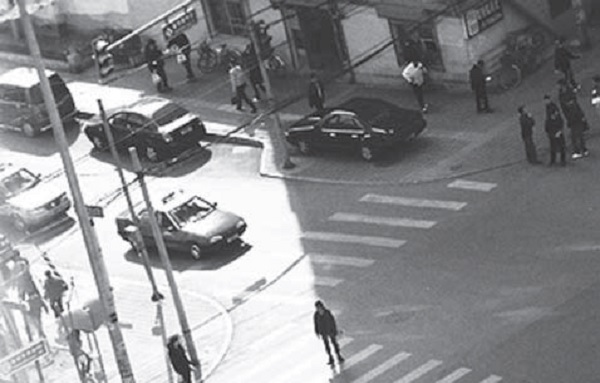living is christ
【Who am I】3

Paul woke the dreamer with one word: "Who am I?" "I am Christ."
Christ was to suffer, to be humiliated, to bear the cross, and to die.Which one of you or me is willing to do this?
Big self vs. small self
Human self-awareness only emerged after the first Adam sinned. Since Adam, this self (ego) consciousness has gradually strengthened into self-will. After infinite expansion, it can even compete with God, causing the self to fall into the abyss of sin.
When Christ, the second Adam, became flesh, his personal ego expanded to the greater ego of God’s love (the world), and the great love of the cross reached its ultimate level. Paul best understands this heavenly heart. The two kinds of love he expounds in the Psalm of Love (1 Corinthians 13) are the contrast between the love of the ego (Eros) and the love of the greater self (Agape).
At that time, the Jews and the Greeks could not break away from the circle of the ego; one wanted miracles, the other wanted wisdom, but neither could get a glimpse of the greater self of the cross (see 1 Corinthians 1:22). Paul himself also started from the ego. He admitted that he was once the chief of sinners (refer to 1 Timothy 1:15). It was not until he accepted the great love of the cross of Christ that he openly stated, "The life I live is Christ" (refer to Philippians 1:21).
Most Christians today still live their lives hidden in the ego, and they still imitate Joseph of Arimathea and become hidden Christians. Because the cross is too heavy to bear after all (refer to John 19:38), it is better to wait to catch the safe shuttle bus to heaven. But Joseph of Arimathea finally appeared openly after the Lord’s crucifixion, provided the tomb as Christ’s resting place before his resurrection, and gave up the ego of a hidden Christian.
When God chose Abraham, he made it clear that “all the families of the earth will be blessed through you” (see Genesis 12:3). However, the nation of Israel established by God's chosen people, the Jews, is still confined to the Palestinian area of the ego, struggling in the surrounding difficulties, and has failed to abide by God's promises and teachings to Abraham.
After Christ's resurrection, the teachings he proclaimed to his disciples required them to spread the gospel from Jerusalem to the ends of the earth and make all nations disciples of the Lord (see Acts 1:8; Matthew 28:18-20). I enter the height and breadth of my Self. God’s chosen people should also expand from the narrow nation of Israel to all the nations of the world.Today’s descendants of Abraham are no longer limited to the ego lineage of Ashram’s flesh, but have expanded to the large ego lineage of the precious blood of the cross of Christ.
In Paul's day, people were already going around in egoistic sectarianism, trying to differentiate between Paul, Apollos, Cephas, and Christ. To this day, the church has not yet escaped the entanglements, obsessions, and imperfections of ego sects, but Paul has already unveiled the cross as the pattern of the greater self (refer to 1 Corinthians 1:10-17).

Who am I?
People who were created in time and space cannot completely escape self-awareness in this world. It is important for a person to know himself. He must clearly know "Who am I?" before he can accept the call and salvation of Christ, become a repentant and saved person, and only then can he take up his cross and follow the Lord.
Paul once introduced himself:"I was circumcised on the eighth day, of the tribe of Benjamin, of the tribe of Israel, a Hebrew by Hebrews. According to the law, I am a Pharisee; according to zeal, I I am a persecutor of the church; I am blameless according to the righteousness of the law.”
He added:“What things were gain to me, I now count as loss for the sake of Christ. Not only that, but I also count everything as loss because of the surpassing worth of knowing Christ Jesus my Lord.” (Reference Philippians. 3:5-8)This is who Paul states "who I am." But what he talked about before was only about his life experience and did not touch on his heart.
After Paul thoroughly examined his heart, he finally confessed his true understanding of himself in his letter to Timothy:"I am the chief of sinners, yet I received mercy." (Refer to 1 Timothy 1:15-16)And how should a chief sinner who has received the mercy of Christ make a correct self-identification? Then Paul said without hesitation:"For to me, to live is Christ, and to die is gain." (Refer to Philippians 1:21)
Paul woke the dreamer with one word: "Who am I?" "I am Christ."
What we pray for and look forward to is the kingdom of Christ. After we pass away, we will rest in the arms of Christ and wait for resurrection with the Lord. But who dares (is willing) to say, I am Christ now? Christ was to suffer, to be humiliated, to bear the cross, and to die. Who is willing to do this? It is up to Paul to wear such a big hat, but we must ask ourselves: Do we really want to? If you want to shun the serious (the cross) and favor the light (live a peaceful life), you can only look at the left and the right.
Paul wants us to answer the question "Who am I" head-on. Dear brothers and sisters, do you and I have the courage to accept the challenge and answer openly and honestly: "As I live, I am Christ"? May we encourage each other and strive to live for the Lord!
 Author profile
Author profile
Pastor Yin Ying is a literary worker who loves literature, nature and praising the Creator. He is also an editor, publisher and communication worker. He once served as corporate editor and president of church news weekly, producer and administrative director of radio and television programs, and pastored the church for more than 20 years. He is the author of many works such as "Return to the Pastoral", "The Bitter Cup and Feast of the Soul", "The Temptation of Stones", "The Footprints of Jesus", "Meditations under the Cross", etc.
